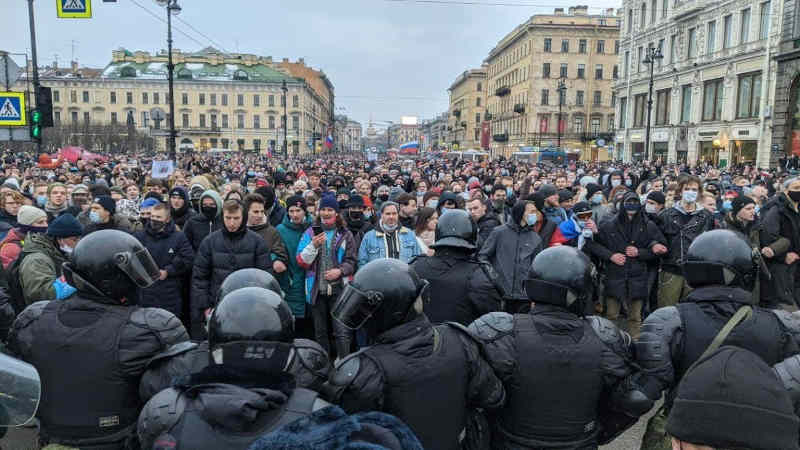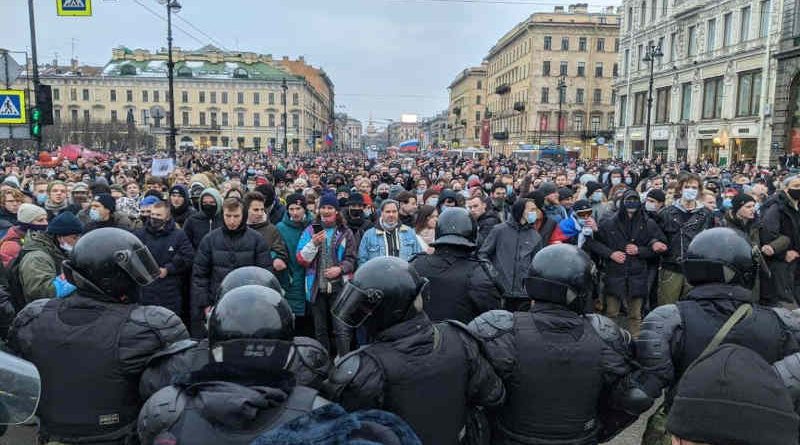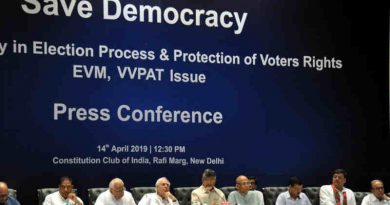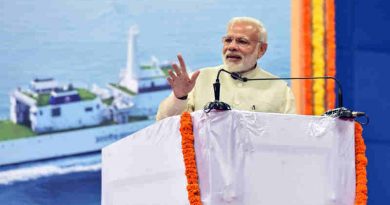Protesters Defy Covid Ban to Protest Against Putin in Russia

Covid-19 pandemic has deepened a crisis for democracy around the world, providing cover for governments to disrupt elections, silence critics and the press.
By Rakesh Raman
At least 3,000 peaceful protesters have been detained in Russia as they were demonstrating Saturday (January 23) against the authoritarian regime of President Vladimir Putin.
An estimated 300,000 protesters gathered in more than 100 cities of Russia to demand the release of opposition leader Alexei Navalny who was arrested at Moscow’s Sheremetyevo airport on January 17 when he returned home for the first time since his poisoning in August last year.
As the authorities were aware of the protests called by jailed Navalny who runs the Anti-Corruption Foundation, they had warned people to stay away from the protests, saying they risked catching Covid-19 infection as well as prosecution and possible jail term for attending an unauthorized event.
But protesters defied the government diktat and came out in large numbers in bitter cold to get rid of Putin’s dictatorship in Russia. Protesters believe that the authorities are using coronavirus as an excuse to derail their protests.
In fact, it is happening in different dictatorship nations where the autocratic rulers are banning protests against them by using Covid-related prohibition laws. In India, for example, authoritarian Prime Minister (PM) Narendra Modi has been banning large-scale protests against him across the country by using a coronavirus excuse.
Hundreds of thousands of Indian farmers, who are protesting on the borders of New Delhi, are defying all preventive norms that are generally advised to be followed to contain the spread of coronavirus.
Earlier, in November, Delhi Police had denied permission to farmers to enter the national capital with the argument that the farmers’ gathering will spread coronavirus in Delhi. Subsequently, farmers decided to sit at the borders instead of holding their demonstrations in the city.
While the protesting farmers are not following the Covid-prevention rules such as safe-distancing and use of face masks, there is hardly any case of Covid infection among the crowds of farmers. It shows that the autocrats are suppressing democratic dissent under the cover of Covid infection while there is hardly any serious risk.
In March 2020, the government had banned the Shaheen Bagh protest in Delhi under the pretext of coronavirus. Thousands of protesters had been camping at the protest site against the anti-Muslim citizenship laws introduced by the Modi government. Protesters asserted that Modi’s discriminatory laws pose a bigger threat than coronavirus.
Citizens have realized that if they have to challenge the autocratic regimes, they will have to show mass resistance on the streets while the social media and other online platforms are not quite effective to continue their struggles.
In October last year, a slew of activists, who were not allowed by the government to demonstrate freely under the pretext of following the coronavirus safe-distancing guidelines, planned to occupy the streets.
They decided to protest on the streets of India instead of just sitting on the inert social media platforms such as Facebook and Twitter, which are not effective if you want to raise your voice against the despotic regimes.
Similarly, thousands of Israelis are defying a new legislation that prohibits street demonstrations during the coronavirus lockdown period to protest against Prime Minister (PM) Benjamin Netanyahu.
The protests are being held across the country for the past many months, as Israelis are asking Netanyahu to resign for his failure to contain coronavirus and amid charges of corruption against him.
The Israeli parliament has passed a law that restricts public demonstrations under the pretext of avoiding Covid-19 infection at crowded places. Many believe that it is a ploy of the government to suppress dissent.
According to Democracy under Lockdown, a new Freedom House report, the Covid-19 pandemic has deepened a crisis for democracy around the world, providing cover for governments to disrupt elections, silence critics and the press, and undermine the accountability needed to protect human rights as well as public health.
Since the coronavirus outbreak began, the condition of democracy and human rights has worsened in 80 countries, with particularly sharp deterioration in struggling democracies and highly repressive states, according to the experts surveyed by the Freedom House project.
By Rakesh Raman, who is a national award-winning journalist and social activist. He is the founder of a humanitarian organization RMN Foundation which is working in diverse areas to help the disadvantaged and distressed people in the society.






